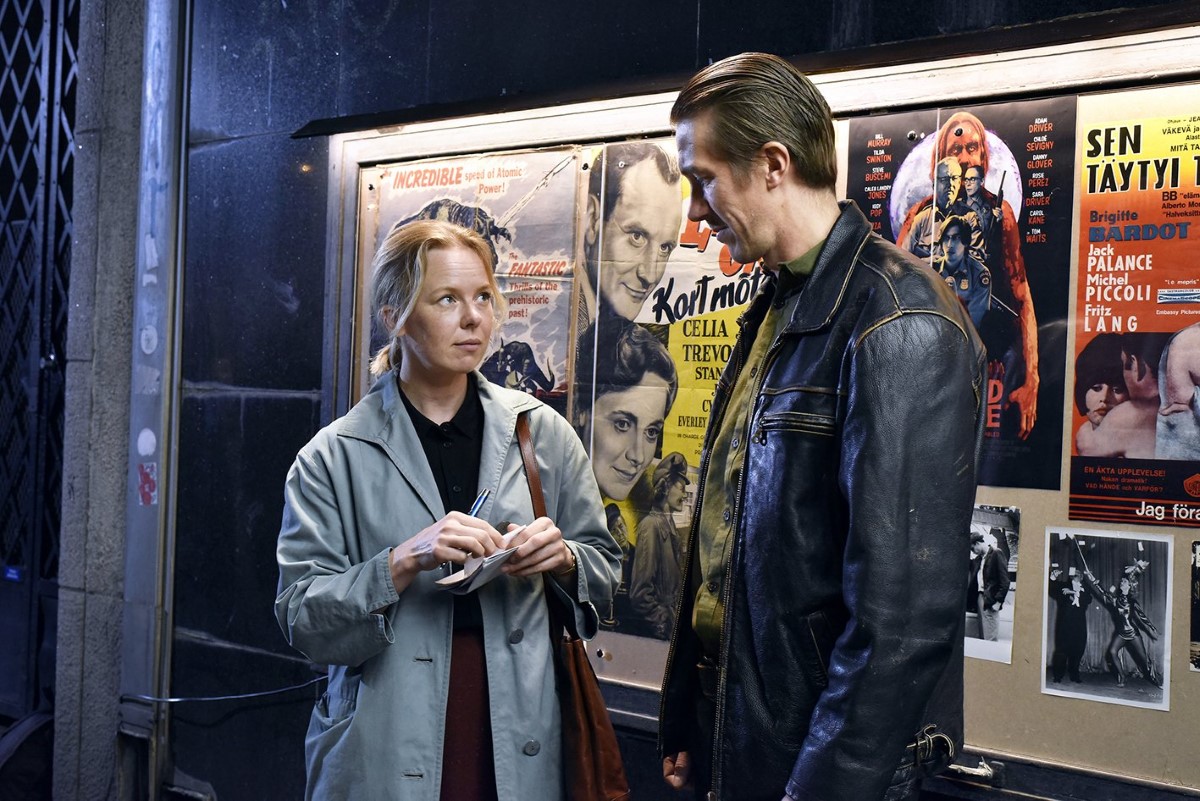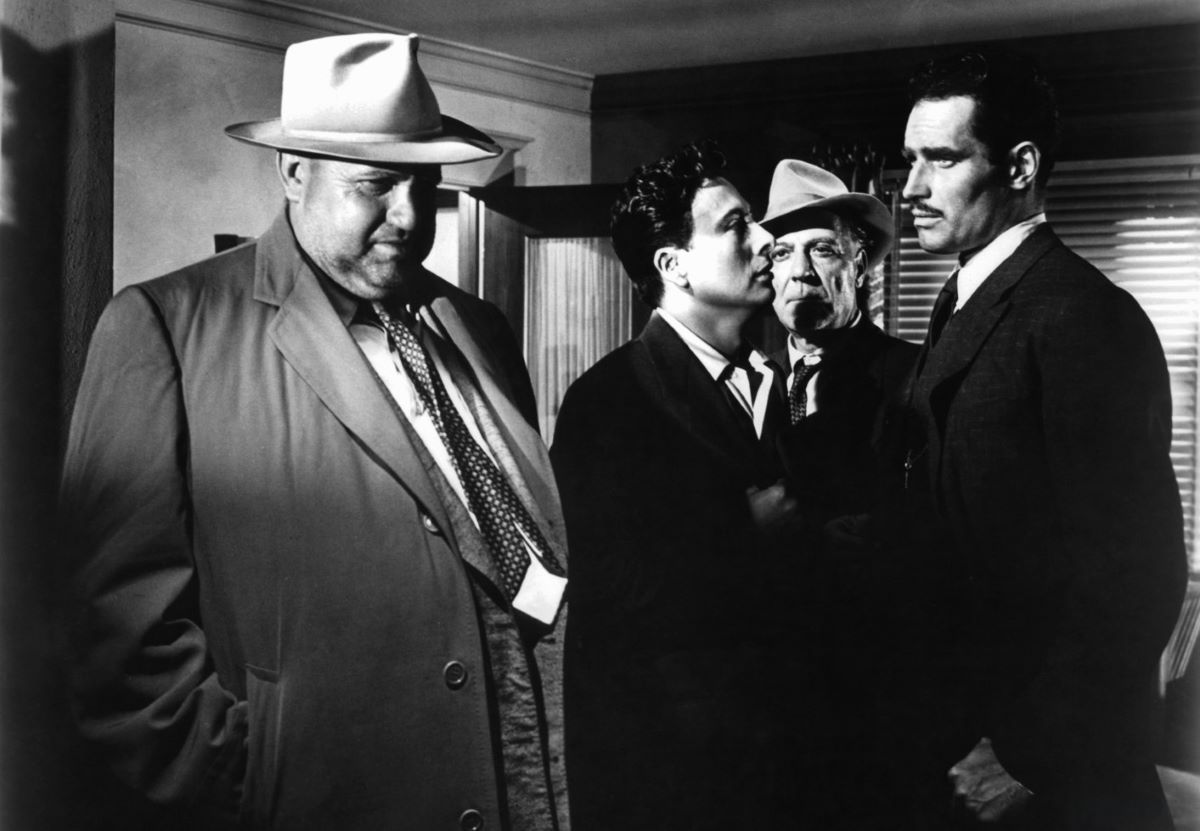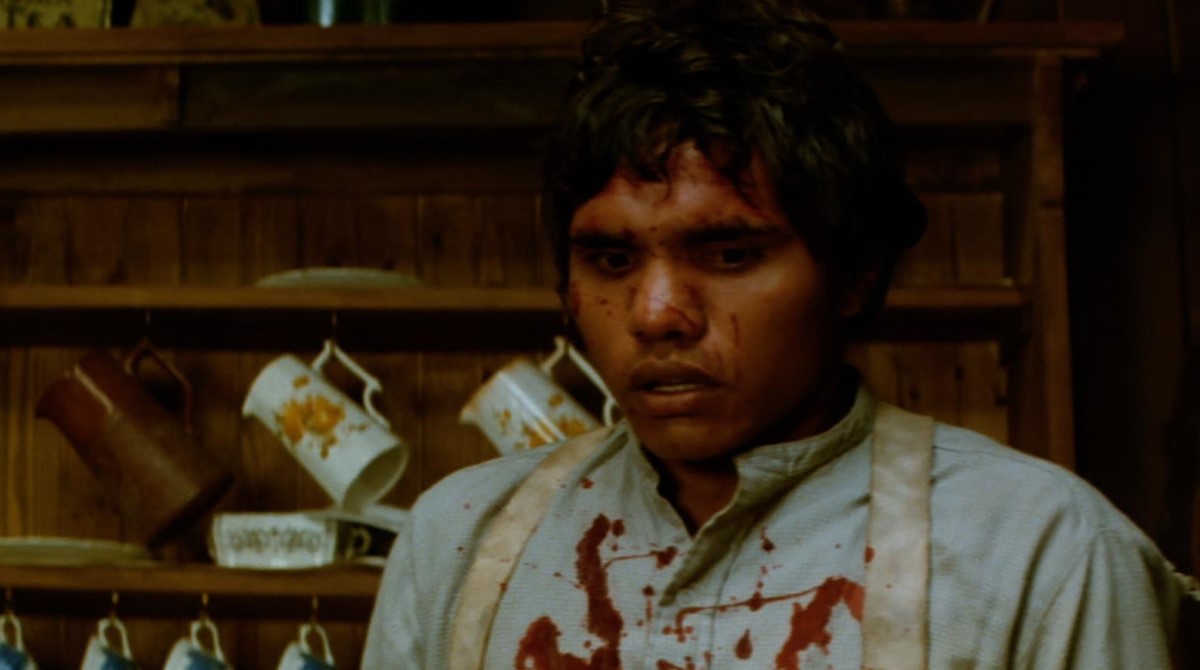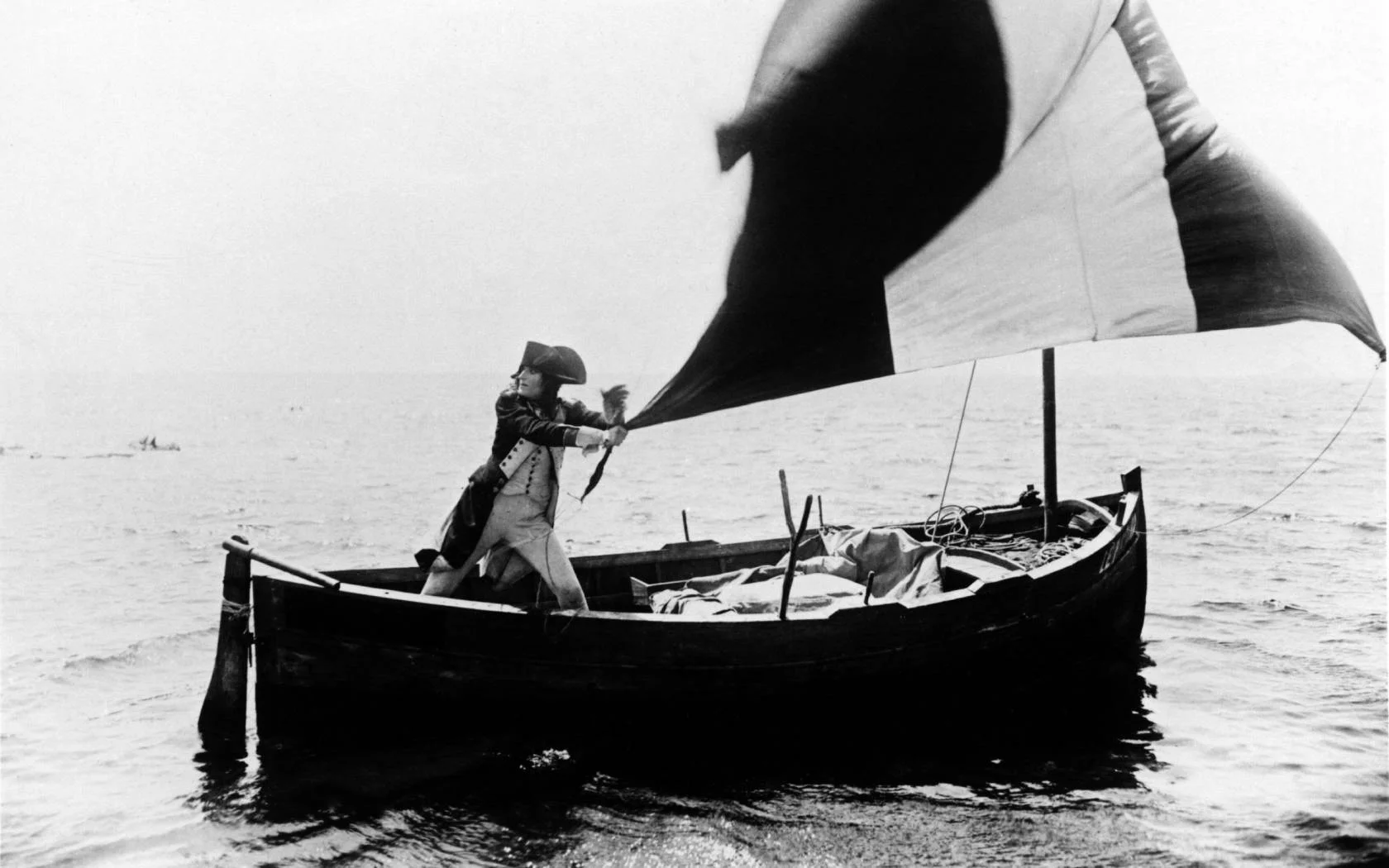The Surreal Poetry of the Last
Aki Kaurismäki’s tender and romantic tragicomedy: Fallen Leaves
by Alessandra De Luca
“A story about the quest for love, solidarity, hope, and respect for others, for nature, and everything that’s alive or dead.” This is how Finnish director Aki Kaurismäki described his 19th film, Fallen Leaves, a romantic tragicomedy that’s both sweet and melancholic. Competing at the last Cannes Film Festival, it snagged the Jury Prize, and will hit theaters on December 21st under Lucky Red. Inspired by the song “Les Feuilles Mortes” composed by Joseph Kosma with lyrics by Jacques Prévert for Marcel Carné’s film Gates of the Night (French: Les Portes de la nuit) and immortalized by Yves Montand’s rendition. This latest installment in the proletarian quadrilogy, which started in 1986 with Shadows in Paradise and continued with Ariel and The Match Factory Girl, Fallen Leaves is the perfect Christmas story for those seeking genuine emotions and off-screen laughter.
The film’s protagonists are two solitary souls who cross paths on a Helsinki night. Each sees in the other their first and last chance for love and happiness, but their journey is fraught with obstacles. Robert Bresson, Yasujirō Ozu, and Charlie Chaplin, along with the previously mentioned Carné, are the guiding spirits of the director, who also nods to David Lean and Jim Jarmusch. Once again, he captures with tenderness and surreal humor a simple humanity on the fringes, timidly seeking their little slice of paradise, perhaps guided towards the future by the Finnish rendition of “Les Feuilles Mortes” and a little dog rescued from death, fittingly named Chaplin, after the funny little man who, despite life’s blows, never lost hope.
“I wrote the script very quickly,” the director shares, “taking exactly thirty hours. The idea emerged from a kind of melancholy I had inside. Then the war in Ukraine erupted, and my fingers dug into my subconscious. Like everyone, I make films for the audience, working for a year giving it my all, trying to offer the best I can, but my responsibility ends when the film is complete. I don’t like to rewatch my old films, I never do. When Luis Buñuel said he hadn’t rewatched any of his films in thirty years, I thought he was lying, but then I became a director and realized that if I watched my work, I would only focus on the mistakes. I’ve been working with the same crew since 1983, we no longer need to talk, we just whistle.”
Thus, the war in Ukraine looms in the small world of the protagonists, heard over the radio. “I thought this world, bloodied by a war you can’t ignore even in a film, deserved a love story. I know I can’t do much, but I felt I had to say something. If you include a piece of news in a film, it will be remembered forever, and maybe in a few years, watching Fallen Leaves, someone will understand how cruel and stupid the world is. People will continue to watch films; cinema is forever, and I would like people to remember in the future what is happening in that land. It might seem trivial, but humanity is all we have left.”
And no one will remain indifferent to the performance of little Chaplin: “He’s my dog, found on the streets of Portugal, and despite not being used to so many people, he was excellent on set. His name is a tribute to the best of all, who created cinema as we know it today, and who, for better or worse, gave birth to Hollywood.”
CIAK, December 2023
ORIGINAL ITALIAN ARTICLE:
La surreale poesia degli ultimi
Aki Kaurismäki firma una tenera e romantica tragicommedia, Foglie al vento, che racconta di un uomo e una donna in cerca d’amore e felicità. Premio della Giuria al Festival di Cannes
di Alessandra De Luca
«Una storia sulla ricerca dell’amore, della solidarietà, della speranza e del rispetto per gli altri, per la natura e tutto ciò che è vivo o morto». Così il regista finlandese Aki Kaurismäki ha descritto il suo nuovo film, il diciannovesimo, Foglie al vento, tragicommedia romantica, dolce e malinconica, in concorso all’ultimo Festival di Cannes, dove ha vinto il Premio della Giuria, in arrivo nelle sale dal 21 dicembre con Lucky Red, ispirata alla canzone Le foglie morte composta da Joseph Kosma su versi di Jacques Prévert per la colonna sonora del film Mentre Parigi dorme di Marcel Carné e resa immortale dall’interpretazione di Yves Montand. Ultimo capitolo della quadrilogia dedicata al proletariato, partita nel 1986 con Shadows in paradise e proseguita con Ariel e The Match Girl, Foglie al vento è la storia natalizia perfetta per chi è in cerca di emozioni sincere e risate fuori dagli schermi.
I protagonisti del film sono infatti due anime sole incontratesi per caso nella notte di Helsinki. Ognuno cerca nell’altro la prima e ultima occasione di amore e felicità, ma molti sono gli ostacoli sul loro percorso. Robert Bresson, Yasujirō Ozu e Charlie Chaplin, ma anche il già citato Carné sono i numi tutelari del regista, che cita pure David Lean e Jim Jarmusch e che ancora una volta fotografa con tenerezza e surreale umorismo una umanità semplice, ai margini, che cerca timidamente la via per il proprio piccolo paradiso, magari facendosi guidare verso il futuro dalle note di Le foglie morte cantata in finlandese e da un cagnolino sottratto alla morte e non a caso chiamato Chaplin, come quell’omino buffo che, nonostante le batoste, non perdeva mai la speranza nella vita.
«Ho scritto la sceneggiatura molto velocemente – racconta il regista – impiegando esattamente trenta ore. L’idea è nata da una sorta di melanconia che avevo dentro. Poi è scoppiata la guerra in Ucraina e le mie dita hanno scavato nel mio subconscio. Come tutti, faccio film per il pubblico, lavoro per un anno mettendocela tutta, cercando di offrire il meglio che posso, ma la mia responsabilità finisce quando il film è completato. Non mi piace rivedere i miei vecchi film, non lo faccio mai. Quando Luis Buñuel diceva che in trentanni non aveva mai rivisto nessuno dei suoi film pensavo che mentisse, ma poi sono diventato regista e ho capito che se rivedessi il mio lavoro tutta la mia attenzione andrebbe solo agli errori. Collaboro con la stessa troupe dal 1983, non abbiamo più bisogno di parlarci, ci limitiamo a fischiare».
Nel piccolo mondo dei due protagonisti si affaccia dunque la guerra in Ucraina, attraverso la radio. «Ho pensato che questo mondo insanguinato da una guerra, che non puoi ignorare neppure se fai un film, meritasse una storia d’amore. So di non poter fare molto, ma sentivo di dover dire qualcosa. Se inserisci una notizia in un film ne resterà memoria per sempre e forse tra qualche anno, guardando Foglie al vento, qualcuno capirà quanto crudele e stupido sia il mondo. La gente continuerà a vedere film, il cinema è per sempre e vorrei che le persone ricordassero in futuro quello che sta accadendo in quella terra. Può sembrare banale, ma l’umanità è tutto ciò che ci è rimasto».
E nessuno potrà rimanere indifferente alla performance del cagnolino Chaplin: «È il mio cane, l’ho trovato per strada in Portogallo e, nonostante non fosse abituato a stare in mezzo a tanta gente, sul set è stato bravissimo. Il suo nome è un omaggio a colui che resta il miglior di tutti, che ha creato il cinema come lo conosciamo oggi, e che, nel bene e nel male, ha fatto nascere Hollywood».
CIAK, dicembre 2023
* * *
Factory, Pub, Cinema: The Backdrop of Fallen Leaves
by Flavio De Bernardinis
The 20th Century, it seems, is not over yet. The title Fallen Leaves is inspired by the classic verses of Jacques Prévert: “The dead leaves gather in heaps…/Like memories, and regrets […]/But my faithful and silent love/still smiles, thanks life.” This rhythm echoes through the film. Leaves clustered in space. Blocks of frames like dangling sculptures in the dim light of Northern Europe. The 20th Century today continues.
The film narrates a story of affection and tenderness between the protagonists, Ansa and Holappa, reminiscent of Pál Fejös’ Lonesome from 1928. In that story, the couple, still engulfed in the chaos of the metropolis, meet, lose each other, and finally reunite. In Helsinki, the same occurs. Gone are the parallel edits between him and her in a Griffithian manner: now, each image is carefully balanced both with the previous and the next. No longer are there characters seeking each other in the crowd, as in the early days of cinema, but rather eyes fixed on an impenetrable point, neither outside nor inside things. Factory, pub, cinema.
The factory, and work in general, is a setting no longer offering guarantees or prospects for those within it. The pub is a communal space where people are together yet not conversing, maybe singing in karaoke. The cinema remains a connective tissue, a place of companionship: movie posters and banners (Godard, Lean, Visconti…) provide a backdrop to the characters, supporting them and watching their backs, tireless sentinels. The 20th Century thus showcases a script still to be performed, to draw inspiration from, to reference: work, music, movies. Before everything turns into a repertoire, passing somberly into the post-prefix, Kaurismäki’s characters, like sculptural activists, leaf through the signifiers and symbols of the 20th century. And something happens.
The gaze, neither outside nor inside things, begins to shape a surrounding, like a sculptor working marble with enveloping models. This surrounding, as every 20th-century cinema would have it, is love. Love and also war. The war looms off-screen. The radio speaks of nothing else, and the protagonist, Ansa, suddenly exclaims: “Damn war!” It’s the current war in Ukraine, yet also the media-centric wars experienced since Vietnam. The short century, it seems, is not ready to bid farewell to the world. And with it, thankfully, cinema.
Kaurismäki thus creates an epic film, not sentimental, but one of resistance and war, through love. A secular love, spanning the entirety of cinema, from Fejös, Chaplin, Lean, Visconti, Godard to Ansa and Holappa. And beyond. The faithful cinematographer, Timo Salminen, having breezed through the screenplay, calls his director, Aki Kaurismäki, and, as it happened back in the 20th century, can’t contain himself: “It’s a masterpiece!”
FilmTV, issue 51, december 19, 2023
ORIGINAL ITALIAN ARTICLE:
FOGLIE AL VENTO
di Flavio De Bernardinis
Fabbrica, pub, cinema: i tre luoghi in cui si svolge la storia di Foglie al vento. Il Novecento, allora, non è finito. Il titolo, Foglie al vento, o meglio “cadute”, “morte”, è ispirato infatti ad alcuni classici versi di Jacques Prévert: «Le foglie morte cadono a mucchi…/Come i ricordi, e i rimpianti […]/Ma il mio fedele e silenzioso amore/sorride ancora, dice grazie alla vita». Il ritmo del film è proprio questo. Foglie addensate nello spazio. Blocchi di inquadrature quali sculture ciondolanti nella luce tenue del nord Europa. Il Novecento oggi prosegue. La storia di affetto e tenerezza fra i due protagonisti, Ansa e Holappa, ricorda Primo amore di Pál Fejös, anno 1928, in cui lui e lei, ancora immersi nel caos della metropoli, si incontrano, si perdono e infine si ritrovano. Qui, a Helsinki, avviene lo stesso. Non c’è più il montaggio parallelo fra lui e lei in chiave ancora griffithiana: ogni singola immagine, ora, è dosata in parallelo sia alla precedente sia alla successiva. Non più sguardi di personaggi che si cercano nella confusione della folla, come nel cinema delle origini, ma occhi fissi su un punto impenetrabile, né fuori né dentro le cose. Fabbrica, pub, cinema. La fabbrica, ma pure il lavoro in generale, è ambiente ormai senza garanzie o prospettiva per chi vi opera. Il pub è spazio comunitario, in cui si sta insieme, però senza parlare, in karaoke o meno, solo cantando. Il cinema è ancora tessuto connettivo, di compagnia: le locandine e i manifesti dei film (Godard, Lean, Visconti…) fanno da sfondo ai personaggi, per sostenerli e guardar loro le spalle, infaticabili sentinelle. Il Novecento esibisce così il testo ancora da recitare, a cui ispirarsi, a cui fare riferimento: il lavoro, la musica, i film. Prima che tutto diventi repertorio, che trascorra lugubre nel prefisso post-, i personaggi di Kaurismäki, scultorei militanti, sfogliano, al vento o meno, i significanti e i simboli del XX secolo. E qualcosa accade. Lo sguardo né fuori né dentro le cose inizia a informare un intorno, come lo scultore lavora il marmo circondando l’immagine di modellature avvolgenti. Questo intorno, come ogni Novecento fatto di cinema vuole, è l’amore. Amore e anche guerra. La guerra incombe fuori campo. La radio non parla d’altro, e la protagonista, Ansa, all’improvviso esclama: «Maledetta guerra!». Che è quella di oggi, in Ucraina, ma sperimentata già nel Novecento, dal Vietnam in poi, ossia una guerra innanzitutto mediatica. Il secolo breve non intende insomma prendere congedo dal mondo. E con questo, per fortuna, il cinema. Kaurismäki realizza così un film epico, non sentimentale, ma di resistenza e di guerra, attraverso l’amore. Un amore secolare, lungo tutto il cinema, da Fejös, Chaplin, Lean, Visconti, Godard fino a questi Ansa e Holappa. E oltre. Il fedele direttore della fotografia, Timo Salminen, dopo aver sfogliato d’un fiato la sceneggiatura del film, telefona al suo regista, Aki Kaurismäki e, come accadeva proprio nel Novecento, non si trattiene: «È un capolavoro!».
FilmTV, n. 51 19 dicembre 2023
* * *
Aki Kaurismäki, the humanist, humorist, and minimalist bard of the downtrodden: Jury Prize at the Cannes Film Festival
by Federico Pontiggia
For forty years, we’ve cherished Aki Kaurismäki, the humanist and minimalist storyteller. His first work, Crime and Punishment, dates back to 1983. At Cannes for the fifth time, the Finnish director, screenwriter, and producer selects as his title and refrain a song by Prevért and Cosma made famous by Yves Montand, Les feuilles mortes (Fallen Leaves, originally Kuollet Lehdet), and continues to use his cinema as a lens on the world, particularly on the forgotten, the marginalized, the weary.
Her (Alma Pöysti) and him (Martti Suaosalo), nameless for universality’s sake, she and he, united by layoffs, she and he, if there’s a chance. They’ve never known love, she’s familiar with renunciation, he with the bottle, and they try to give themselves hope by going to the cinema to mark a beginning: they watch and enjoy The Dead Don’t Die, a sociological metaphor here, but in immediate analysis, they are torn apart by other viewers, who in Jim Jarmusch’s zombie movie see traces of Bresson’s Diary of a Country Priest and Godard’s Band of Outsiders.
Understood, the film’s irony sharpens and soothes, or at least tries to, the bitter reality of contemporary Helsinki, punctuated by radio news of the war in Ukraine, and a labor market that is unfair and oppressive, with zero-hour contracts, nonexistent protections, and daily retaliation.
The unchained master of the Leningrad Cowboys diptych, The Man Without a Past, and Le Havre reaffirms his poetic modernism, Chaplinesque symmetries, and a calm but firm tension towards a satisfaction, never a reward, for the humiliated and insulted, vilified at work and clinging to life – until fate or a train tries to pull them apart.
She likes him, he likes her, but he’s an alcoholic and she, having lost her father and brother to drinking and her mother to the ensuing grief, can’t afford him: will our antihero, who finds some continuity behind the camera on this theme, manage to drop the bottle and commit to her?
The worker caught drinking is abruptly fired, the boss who skimps on safety is untouchable, and similarly, expired food must meet no other fate than the dumpster, or face job loss: Aki exposes himself, even the other cheek, but it’s not his passive resistance, it’s latent conflictuality, rather life and thought entrusted to the big screen with full faith in the magnificent and progressive destiny of the Seventh Art.
Not the cure-all for all evils, not a cosmetic for the world’s ugliness, but the possibility in cinematic storytelling to change a bad Story: Aki Kaurismäki has a plan, better yet, a close-up and many others.
Cinematografo, May 22, 2023
ORIGINAL ITALIAN ARTICLE:
Foglie al vento
Aki Kaurismäki, il cantore umanista, umorista e minimalista degli umiliati e offesi: Premio della Giuria al Festival di Cannes
di Federico Pontiggia
Lei (Alma Pöysti) e lui (Martti Suaosalo), senza nome per universalità, lei e lui, uniti dai licenziamenti, lei e lui, se c’è una possibilità. Non hanno conosciuto l’amore, lei piuttosto la rinuncia, lui la bottiglia, e provano a darsi una speranza, andando al cinema per suggellare un inizio: vedono e gradiscono I morti non muoiono, qui metafora sociologica, ma nell’analisi a caldo vengono stracciati da altri spettatori, che nello zombie-movie di Jim Jarmusch ravvisano Diario di un curato di campagna di Bresson e Bande à part di Godard.
Ci siamo capiti, l’ironia affina il film e lenisce, ci prova, l’amara realtà, che nella Helsinki contemporanea cadenzata dai giornali radio sulla guerra in Ucraina alloca un mercato del lavoro iniquo e vessatorio, tra contratti a zero ore, tutele inesistenti e ritorsioni quotidiane.
Prossimamente in sala con Lucky Red, il maestro senza cattedra del dittico Leningrad Cowboys, L’uomo senza passato e Miracolo a Le Havre conferma il modernariato poetico, le simmetrie chapliniane, la calma ma ferma tensione a una soddisfazione, giammai ricompensa, degli umiliati e offesi, vilipesi al lavoro e appesi alla vita – finché treno non ci provi a separare.
A lei piace lui, a lui piace lei, ma lui è alcolizzato e lei, che ha perso il padre e il fratello con il gomito alzato e la madre per il dolore conseguente, non se lo può permettere: riuscirà il nostro antieroe, che sul tema trova qualche continuità dietro la macchina da presa, a mollare la bottiglia e darsi a lei?
L’operaio sorpreso a bere viene licenziato in tronco, il padrone che risparmia sulla sicurezza non lo tocca alcuno, e parimenti i cibi scaduti non dovranno conoscere altra destinazione che il cassonetto, pena la perdita del lavoro: Aki presta il fianco, pure l’altra guancia, ma non è la sua resistenza passiva, conflittualità latente, piuttosto vita e pensiero consegnati al grande schermo con piena fiducia nelle sorti magnifiche e progressive della Settima Arte.
Non la panacea di tutti i mali, non la cosmesi alle brutture del mondo, ma la possibilità nel racconto cinematografico di cambiare una brutta Storia: Aki Kaurismäki ha un piano, meglio, un primo piano e molti altri.
Cinematografo, 22 maggio, 2023





